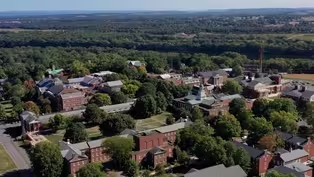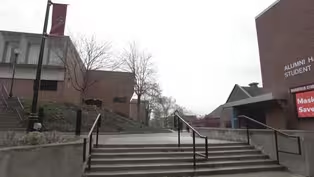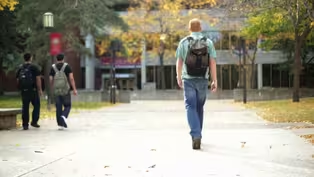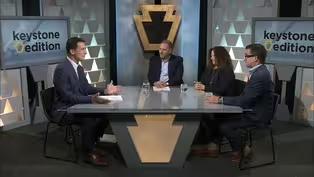Keystone Edition
Challenges and Opportunities for Higher Education
Clip: 10/14/2024 | 12m 23sVideo has Closed Captions
This clip highlights the challenges faced by institutions as they navigate declining enrollments.
Teri Ooms provides a broad perspective on the demographic shifts and workforce shortages affecting the education sector. Dan Knorr shares insights from Commonwealth University’s consolidation of campuses and its efforts to remain financially viable while maintaining strong community ties. Larry Newman emphasizes the importance of universities as economic pillars in downtown areas.
Problems playing video? | Closed Captioning Feedback
Problems playing video? | Closed Captioning Feedback
Keystone Edition is a local public television program presented by WVIA
Keystone Edition
Challenges and Opportunities for Higher Education
Clip: 10/14/2024 | 12m 23sVideo has Closed Captions
Teri Ooms provides a broad perspective on the demographic shifts and workforce shortages affecting the education sector. Dan Knorr shares insights from Commonwealth University’s consolidation of campuses and its efforts to remain financially viable while maintaining strong community ties. Larry Newman emphasizes the importance of universities as economic pillars in downtown areas.
Problems playing video? | Closed Captioning Feedback
How to Watch Keystone Edition
Keystone Edition is available to stream on pbs.org and the free PBS App, available on iPhone, Apple TV, Android TV, Android smartphones, Amazon Fire TV, Amazon Fire Tablet, Roku, Samsung Smart TV, and Vizio.
Providing Support for PBS.org
Learn Moreabout PBS online sponsorshipNow to our panelists.
Larry, Teri, Dan, thank you much for joining us for this important conversation.
I value each of the perspectives and expertise you bring from your roles.
Teri, I'd like to start with you.
In hearing the numbers that Sarah presented, what is your broader perspective from the research that the institute does?
How is that impacting universities in our region?
What are these universities doing to prepare for this situation that's already starting to impact them?
- Well, the situation wasn't really a surprise.
We've heard a lot of college presidents talking about this issue now for five, six, seven, eight years.
They knew it was coming.
There's been a demographic shift across the country where folks are having fewer kids.
It wasn't just the result of the recession of 2008.
It's now a continuing trend, and we're facing a situation nationally where there are more older people and more people growing older leaving the workforce than there are people behind them.
So that means there's incredible opportunity in nearly every sector and for every type of education and skill level.
So what this means for the traditional four year liberal arts education and the colleges there is a challenge to compete where they didn't have to compete before.
Students are looking for ways to graduate quicker, taking college credit in high school, looking for programs where they eliminate a lot of the electives and focus on majors and minors.
And so you could finish in two or three years with a bachelor's degree because alternatives do exist.
And now we're even seeing employers relaxing college requirements in order to successfully recruit because they are now seeing the effects of the workforce.
So it's this perfect storm of demographics and workforce shortage that are putting pressure on higher education institutions, and those that can be more proactive and innovative in their thought process on how to move forward are really the ones that are gonna be succeeding as we go forward.
- Are there types of institutions that are in more peril?
Not to put too negative a spin on this, but locations, large or small, type of instruction?
- The data points to four year liberal arts colleges, private schools where tuition is typically a little bit higher, and that liberal arts education requires additional credits in a variety of different humanities and arts areas that certainly add value, but in this day and time, don't seem to carry as much value with the student that they did in the past.
- Okay, Dan, I'd like to ask you about your experience at Commonwealth University and talk about the road that you've been on and that the university and formerly universities have had.
What kind of changes have been happening in your world?
- Absolutely, yeah, so this isn't new to us.
All three of our campuses had peak enrollment probably around 2010, 2011.
So we've seen that decline in enrollment since then.
What's probably unique about us is that Commonwealth University itself formed sort of in response to how we handle that.
We were three separate universities, Bloomsburg University, Lock Haven University, and Mansfield University.
We consolidated together as one, but we still have all three campuses, you know, alive and vibrant, but what we were able to do was consolidate some of those backend things that students don't see, it doesn't impact them.
You know, we have one HR team, one IT team, one president, one CFO, you name it.
So we were really able to be a little more effective and efficient on the backend, keep the student experience just what they're used to pre-merger, but that's been one of the ways that we've really responded to a shrinking student base.
- That relationship that the campuses, each of those three campuses, longstanding relationship with, well, their students and employees, but communities, can you talk about how that has been challenges and also work to sustain that relationship for each of those campuses?
- It was a real driving priority.
You know, we're a state-owned university.
We're part of the Pennsylvania state system.
So for the legislature and Governor Wolf at the time, having these campuses and knowing that they're economic anchors in their communities, closure just wasn't on the table.
You know, it wasn't a question, and it isn't a question now.
It's how can we continue to make sure they're vibrant at the student population that we have now?
That is how can we make that sustainable financially for the institution and make sure that they're still the economic drivers that they are?
In many cases, in all three of our cases, we're the largest employers in our counties.
So it's incredibly important to those communities.
I'm a former mayor.
I served two terms over a decade ago in Bloomsburg, so I saw it from that side.
I know how valuable that university is to the community, and we were really intent to make sure that didn't change.
- Now I know Larry's gonna bring perspective from that community side, but I want to ask both of you this.
That perspective as, well, an elected official, and, Larry, I'm gonna turn to you to join the conversation here, with the Diamond City Partnership, you have and the community has relationships with more than one school.
Can you talk about how important a university, a college is to a downtown and beyond that downtown, the broader region?
- Sure.
In downtown Wilkes-Barre, the campuses of Kings College and Wilkes University together comprise one of our downtown's primary economic pillars, and we're fortunate that we have multiple economic pillars, but we are a little unusual in that we do have two college campuses, two four year institutions, along with a Luzerne County Community College Satellite Center in our downtown core.
And so what that means is that right now, we have around 6,200 undergraduate and graduate students total attending those institutions in Downtown Wilkes-Barre.
That has always been an important part of our downtown economy.
It has become an even more important part of our downtown economy as other pillars of the downtown economy, primarily the office market, have receded in importance following the COVID pandemic and what that has meant in terms of the rise of remote work.
So, as an example, a quarter of all of the visitors to downtown Wilkes-Barre during the last 12 months were visitors to either Kings or Wilkes.
We know that from location analytics data.
Similarly, the employees and faculty at Kings and Wilkes in 2019 comprised around 20% of all of the employee visits to Downtown Wilkes-Barre.
Because of the shifts in remote work, Kings and Wilkes faculty and staff now comprise 41% of all of the employee visits to downtown during the last 12 months.
It's enormously important to us.
They are anchors in downtown Wilkes-Barre.
Just as colleges and universities in our region are anchors to their own communities.
- How much do the universities, do those institutions and their leadership connect with community leaders like you to get a sense of their role, to foster, and build that relationship?
What does that relationship look like for you in the role that you have with the leadership of universities?
- I know that in the case of downtown Wilkes-Barre, we have seen an ever strengthening bond between town and gown because what I think both the higher ed institutions have realized and what business communities have realized is that we can't succeed without the success of our partners on the other side.
The town can't succeed without the gown, and gown can't succeed without the town.
The campuses of those schools need to be set in places that are themselves vibrant attractions for students to choose to want to attend school there.
And these schools are economic engines for their communities.
So we have gotten very, very good at partnering with each other during the last several decades.
And in fact, I think some of the things that we have done in Downtown Wilkes-Barre have really been very innovative in showing how smaller, tuition-driven liberal arts schools can partner with their host communities to build a better future for both the town and the campus.
- Any particular initiatives or events that you're most proud of in that regard?
- I think there are a lot of things that we're really, really excited about, but I would just point to the way in which both schools have been able to take advantage of opportunities to redevelop real estate, landmark buildings in some cases in our downtown that are not being as well utilized as they should or in some cases were completely vacant and turn them into new facilities serving their students and bringing new programs into place.
Just last week, King's College rededicated the former 1920s era home of one of our daily newspapers, The Times Leader, as its new Kowalski Center for Advanced Health Education, which is the home of Kings College's new Doctorate in Occupational Therapy Program.
That's a brand new program that is bringing new students to the college and new life to that section of Downtown Wilkes-Barre.
And there are many.
That's only the latest of multiple examples at both schools where we have been able to partner together for what is really both economic development and institutional development.
- Thanks.
Dan, back to you.
I wanna come back to that experience that you have as a former mayor, seeing and having a perspective on then Bloomsburg University.
From that elected office, what did you experience then, and how has that changed over the years for that community and for you in a changing role now with the university?
- No, I think, you know, and we feel as a state university, I think, a special commitment to the public side of it, to the town, to our communities that host us because we are a public entity, and that's important to us.
You know, having those partnerships isn't just altruistic on our part, though.
Our students, when they're coming in as prospective students with their families, we're foolish if we think that we can thrive if the communities around us are dilapidated or having, you know, issues.
So, that's a key part, is making sure there's vibrancy around campus as well.
- All right, I want to hear from our video now.
Clip: 10/14/2024 | 2m 14s | At Bucknell, strategic initiatives have led to record-breaking enrollment for 3 consecutive years. (2m 14s)
Education on the Edge - Preview
Preview: 10/14/2024 | 30s | Watch Monday, October 14th at 7pm on WVIA TV (30s)
Clip: 10/14/2024 | 1m 43s | An explanation of the factors contributing to an impending enrollment decline at local universities (1m 43s)
Remote/Hybrid Learning, Competition, and Economic Impact
Video has Closed Captions
Clip: 10/14/2024 | 8m 25s | Learn about the innovations happening in higher education. (8m 25s)
Providing Support for PBS.org
Learn Moreabout PBS online sponsorship
- News and Public Affairs

Top journalists deliver compelling original analysis of the hour's headlines.

- News and Public Affairs

FRONTLINE is investigative journalism that questions, explains and changes our world.












Support for PBS provided by:
Keystone Edition is a local public television program presented by WVIA



